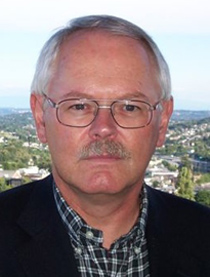
Spirituality
When did Jesus have nothing further to achieve?

Rolheiser
When is our life fulfilled? At what point in our lives do we say: "That's it! That's the climax! Nothing I can do from now on will outdo this. I've given what I have to give."
When can we say this? After we've reached the peak of our physical health and strength? After giving birth to a child? After successfully raising our children? After we've published a best-seller? After we're famous? After we've won a major championship? After we're celebrated the sixtieth anniversary of our marriage? After we've found a soulmate? After we're at peace after a long struggle with grief? When is it finally done? When has our growth reached its furthest place?
The medieval mystic, John of the Cross, says we reach this point in our lives when we have grown to what he calls "our deepest center". But he doesn't conceive of this the way we commonly picture it, namely, as the deepest center inside our soul. Rather, for John, our deepest center is the optimum point of our human growth, that is, the deepest maturity we can grow to before we begin to die. If this is true, then for a flower, its deepest center, its ultimate point of growth, would be not its bloom but the giving of its seed as it dies. That's its further point of growth, its ultimate accomplishment.
What's our ultimate point of growth? I suspect that we tend to think of this in terms of some concrete, positive accomplishment, like a successful career or some athletic, intellectual, or artistic achievement that's brought us satisfaction, recognition, and popularity. Or, looked at from the point of view of depth of meaning, we might answer the question differently by saying that our ultimate achievement was a life-giving marriage, or being a good parent, or living a life that served others.
When, like a flower, do we give off our seed? Henri Nouwen suggests that people will answer this very differently: "For some it is when they are enjoying the full light of popularity; for others, when they have been totally forgotten; for some, when they have reached the peak of their strength; for others, when they feel powerless and weak; for some it is when their creativity is in full bloom, for others, when they have lost all confidence in their potential."
When did Jesus give off his seed, the fullness of his spirit? For Jesus, it wasn't immediately after his miracles when the crowds stood in awe, and it wasn't after he had just walked on water, and it wasn't when his popularity reached the point where his contemporaries wanted to make him king that he felt he had accomplished his purpose in life and that people began to be touched in their souls by his spirit. None of these. When did Jesus have nothing further to achieve?
It's worth quoting Henri Nouwen again, in answering this question: "We know one thing, however, for the Son of Man the wheel stopped when he had lost everything: his power to speak and to heal, his sense of success and influence, his disciples and friends -- even his God. When he was nailed against a tree, robbed of all human dignity, he knew that he had aged enough, and said: 'It is fulfilled'" (John 19, 30).
"It is fulfilled!" The Greek word here is Tetelesti. This was an expression used by artists to signify that a work was completely finished and that nothing more could be added to it. It was also used to express that something was complete. For example, Tetelesti was stamped on a document of charges against a criminal after he had served his full prison sentence; it was used by banks when a debt had been repaid; it was used by a servant to inform his master that a work had been completed; and it was used by athletes when, tired and exhausted, they successfully crossed the finish line in a race.
It is finished! A flower dies to give off its seed so it's appropriate that these were Jesus' last words. On the cross, faithful to the end, to his God, to his word, to the love he preached, and to his own integrity, he stopped living and began dying, and that's when he gave off his seed and that's when his spirit began to permeate the world. He had reached his deepest center, his life was fulfilled.
When does our living stop and our dying begin? When do we move from being in bloom to giving off our seed? Superficially, of course, it's when our health, strength, popularity, and attractiveness begin to wane and we start to fade out, into the margins, and eventually into the sunset. But when this is seen in the light of Jesus' life, we see that in our fading out, like a flower long past its bloom, we begin to give off something of more value than the attractiveness of the bloom. That's when we can say: "It is fulfilled!"
Oblate Father Ron Rolheiser, theologian, teacher, and award-winning author, is President of the Oblate School of Theology in San Antonio, TX. He can be contacted through his website www.ronrolheiser.com.
Now on Facebook www.facebook.com/ronrolheiser
- Oblate Father Ron Rolheiser, theologian, teacher, and award-winning author, is President of the Oblate School of Theology in San Antonio, TX. He can be contacted through his website www.ronrolheiser.com.
Now on Facebook www.facebook.com/ronrolheiser
Recent articles in the Spirituality section
-
He saw the cloths and believedBishop Robert Barron
-
God's instrument for viewing the crucifixionMichael Pakaluk
-
QuinquagesimaMichael Pakaluk
-
Pro-life Christians: Now is the time to shout from the rooftopsBishop Robert Barron
-
Seeking an indulgence as an act of faithMichael Pakaluk


















